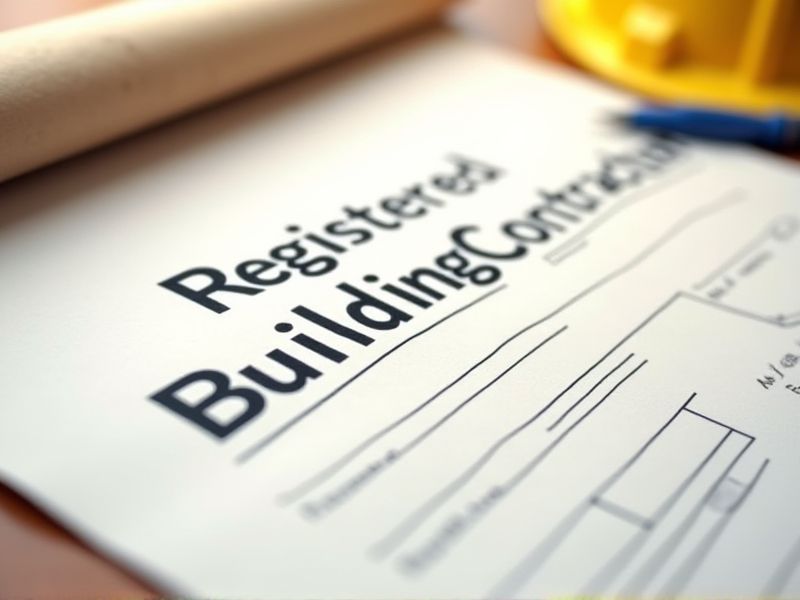
Registered Building Contractors require specific certifications to ensure they possess the necessary skills and knowledge to meet industry standards. Certifications demonstrate a contractor's competence and commitment to quality, which enhances client trust and safety in construction projects. Regulatory bodies mandate these certifications to ensure compliance with safety protocols and building codes. Here are some important certifications that you may need as a Registered Building Contractor.
Registered Building Contractor License
A Registered Building Contractor License ensures that a contractor has met specific educational and professional standards, which instills trust among clients and stakeholders. Obtaining this license often leads to adherence to industry regulations, minimizing legal complications and promoting safety. The license serves as a mark of credibility, positively impacting business opportunities and client acquisition. Contractors with a license are better positioned to bid on larger projects, which can lead to increased revenue and growth.
OSHA 30-Hour Construction Safety Certification
The OSHA 30-Hour Construction Safety Certification equips contractors with essential knowledge about workplace safety hazards, reducing the risk of accidents on construction sites. Understanding these hazards leads to the implementation of more effective safety protocols, which potentially lowers insurance costs and liability issues for registered building contractors. Compliance with OSHA's training requirements often becomes a prerequisite for securing certain construction projects, as it assures clients of a contractor's commitment to safety regulations. Through this certification, contractors demonstrate a commitment to creating a safer work environment, which can improve worker morale and productivity.
LEED Accredited Professional (LEED AP)
The LEED Accredited Professional credential ensures a Registered Building Contractor has specialized knowledge in sustainable building practices, which can lead to more efficient and environmentally friendly projects. This expertise often translates into competitive advantages in the market, as more clients prioritize green building initiatives. Achieving LEED certification for a project requires navigating complex documentation and processes that a LEED AP is trained to handle. Employing a LEED AP can improve the likelihood of successfully attaining certification, thereby enhancing the project's perceived value and potentially increasing the contractor's reputation and job prospects.
Certified Construction Manager (CCM)
Having a Certified Construction Manager (CCM) on board elevates the credibility of a Registered Building Contractor due to the CCM's adherence to recognized industry standards. This certification ensures that project management best practices are consistently applied, minimizing the risk of delays and cost overruns. The expertise of a CCM in coordinating complex construction processes often results in higher quality outcomes and increased client satisfaction. Employing a CCM also aligns the contractor with continued professional development, keeping pace with evolving construction regulations and technologies.
Project Management Professional (PMP)
A Project Management Professional (PMP) certification equips a registered building contractor with standardized project management practices, increasing efficiency and reducing project delays. This certification demonstrates a contractor's commitment to quality and adherence to industry standards, enhancing credibility and trust among clients and stakeholders. Project schedules and budget constraints, often critical in construction, benefit from the structured methodologies taught in PMP training. PMP-certified contractors gain competitive advantages by possessing skills to mitigate risks and navigate complex building projects effectively.
Certified Professional Constructor (CPC)
Certified Professional Constructor (CPC) ensures a standardized level of expertise and competency in the construction industry. This certification requires contractors to meet rigorous education and experience standards, improving project outcomes. Registrations with CPC boost client trust and credibility, potentially increasing business opportunities for contractors. Regulatory requirements often favor or mandate CPC certifications, aligning with evolving industry standards and legal compliances.
Building Information Modeling (BIM) Certification
Building Information Modeling (BIM) Certification helps ensure registered building contractors possess the skills and knowledge to effectively manage digital representations of a building's characteristics. Contractors with BIM expertise reduce the likelihood of project errors due to improved accuracy in design and documentation. The certification also facilitates better collaboration among different stakeholders, enhancing communication and reducing costs. With the increasing industry shift towards integrated and sustainable construction practices, certified contractors remain competitive and relevant in the evolving market.
Construction Health and Safety Technician (CHST)
The presence of a Construction Health and Safety Technician (CHST) ensures that a Registered Building Contractor adheres to industry safety standards, reducing the risk of worksite accidents. A CHST identifies potential hazards early, allowing for prompt corrective action, which minimizes potential project delays. Their expertise in safety management enhances overall site productivity by facilitating a safer and more organized work environment. When a contractor employs a CHST, it often results in lowered insurance premiums due to improved safety records, providing financial benefits to the company.
Certified Construction Supervisor (CCS)
Certified Construction Supervisors (CCS) bring specialized knowledge that ensures building projects meet regulatory standards, facilitating compliance and reducing the risk of legal issues. This expertise helps Registered Building Contractors maintain high-quality builds, enhancing their reputation and competitiveness in the industry. CCS professionals contribute to effective project management, minimizing delays and optimizing resource use through proficient coordination of labor and materials. Their role in safety oversight reduces workplace incidents, ensuring healthier job sites and lowering insurance costs for contractors.
NAHB Certified Graduate Builder
A Registered Building Contractor with NAHB Certified Graduate Builder credentials is equipped with advanced construction management skills, leading to efficient project execution. Enhanced knowledge in sustainable building practices ensures adherence to modern environmental standards. Expertise in risk management and financial planning often results in cost-effective solutions. Improved customer relations and communication skills frequently lead to higher client satisfaction rates.
Summary
When you, as a Registered Building Contractor, acquire additional certifications, you'll attract more clients due to enhanced credibility and trustworthiness. These certifications often lead to an increase in project opportunities, as clients seek skilled professionals. You might also see an improvement in your project's quality and efficiency, thanks to advanced knowledge and techniques gained. As a result, you could potentially command higher fees and elevate your market position, reflecting your expertise.
